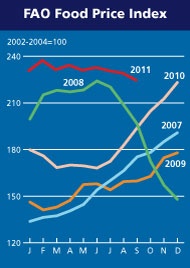
How much has changed in last 60+ years to erase hunger? There are still as many or more hungry today although relatively speaking more are receiving enough nutrition. Perhaps the greatest change is not in terms of availability of food but the volatility of prices. The earth is producing more food than ever before. However, due to logistics, waste and spiking prices perhaps more people in absolute terms face “food insecurity.” A billion go to sleep hungry every night. (See FILM REPORT -
diplomaticallyincorrect.org/films/movie/billion-to-sleep-hungry/24674 ). There were an estimated 925 million hungry people in the world in 2010, as compared to 850 during the period from 2006-2008, according to FAO.
UN institutions on hunger called for action to ensure long-term food security as a new report shows that high food prices are likely to continue and possible increase over the next decade. “The State of Food Insecurity in the World 2011,” an annual flagship report that the three Rome-based agencies jointly produced this year, states that small, import-dependent countries, particularly in Africa, are especially vulnerable to poverty and food insecurity.
Best Case Scenario – 600 Million Hungry Each Day:
The report – produced by the UN Food and Agriculture Organization (FAO), the International Fund for Agricultural Development (IFAD) and the World Food Programme (WFP) – says that crises, such as the food crisis several years ago and the current one in the Horn of Africa, “are challenging our efforts to achieve the Millennium Development Goal (MDG) of reducing the proportion of people who suffer from hunger by half in 2015. Even if the MDG were achieved by 2015 some 600 million people in developing countries would still be undernourished. Having 600 million people suffering from hunger on a daily basis is never acceptable,” the heads of the three agencies said in the preface to the report.
Recommendations for Action:
Among its recommendations, the report calls on Governments to ensure that a transparent and predictable regulatory environment is in place, one that promotes private investment and increases farm productivity. “We must reduce food waste in developed countries through education and policies, and reduce food losses in developing countries by boosting investment in the entire value chain, especially post-harvest processing.” It also calls for more sustainable management of natural resources, forests and fisheries, all of which are critical for the food security of many of the poorest members of society.
High & Volatile Food Prices:
This year’s global hunger report focuses on high and volatile food prices, major contributing factors in global food insecurity. Food price volatility may increase over the next decade, it notes, due to increasing demand from consumers in rapidly growing economies, a population that is on the rise, further growth in biofuels that will place additional demands on the food system, as well as more frequent extreme weather events.
Meanwhile, stronger economies and high food prices present incentives for increased long-term investment in the agricultural sector, which can contribute to improved food security in the long run, the report adds. “When farmers react to higher prices with increased production it is essential to build on their short-term response with increased investment in agriculture, with emphasis on initiatives that support smallholders, who are the main food producers in many parts of the developing world,” the agencies stated in a joint news release. The report stresses that investment in agriculture remains critical to sustainable, long-term food security and calls for directing resources to cost-effective irrigation, improved land-management practices and better seeds developed through agricultural research.
Speculation, Production & Demand Changing:
Volatility is also reflected or perhaps aggravated by action in the commodity/financial markets. Speculation appears to have an ever-greater impression upon rapid movements in prices. Such speculative spikes and food insecurity is also a point of contention for the “Occupy Wall Street” protesters. From my perspective, while speculation has always been a part of food commodity markets (such as grains and meat) and many would argue is a necessary party of farmers hedging, the volatility appears greatest in perhaps a century. Production has also undergone cycles of boom and bust, but volatility appears to be more prevalent. The other changing consideration is consumption and demand based more on a higher demand for meat and grains in rapidly developing societies where new wealth is altering nutrition/eating habits. Nonetheless, it is my anticipation that speculation and the markets, which are financial platform for such is increasingly coming under scrutiny, perhaps further prompted by Wall Street protesters.
ARTICLE – “Land Grabbing Threatening Food Security” -
diplomaticallyincorrect.org/films/blog_post/land-grabbing-threatening-food-security-by-ambassador-mo/35743
ARTICLE – “Food Shortages & Price Spikes Coming” -
diplomaticallyincorrect.org/films/blog_post/food-shortages-prices-spikes-coming-by-ambassador-mo/28468
By Ambassador Muhamed Sacirbey
Facebook – Become a Fan at “Diplomatically Incorrect”
Twitter – Follow us at DiplomaticallyX
International Financial Crisis Channel -
diplomaticallyincorrect.org/c/international-financial-crisis

